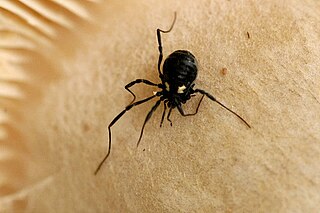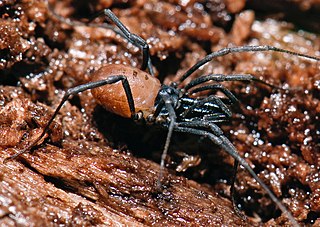
Dyspnoi is a suborder of harvestmen, currently comprising 43 extant genera and 356 extant species, although more species are expected to be described in the future. The eight families are currently grouped into three superfamilies: the Acropsopilionoidea, Ischyropsalidioidea, and Troguloidea.

The Phalangodidae are a family of harvestmen with about 30 genera and more than 100 described species, distributed in the Holarctic region.

Sabacon is a genus of the monotypic harvestman family Sabaconidae, with 59 species.

Ischyropsalididae is a family of harvestmen with 35 described species in 3 genera, found in Europe and North America.

The Nemastomatidae are a family of harvestmen with about 170 described species in 16 recent genera. Several fossil species and genera are known.

The Ceratolasmatidae are a family of harvestmen with eleven described species.

The Cladonychiidae are a small family of harvestman with about 33 described species, within the suborder Laniatores.

Taracus is a genus of harvestman, or Opiliones, typically found living in limestone and lava caves in the United States. They grow to a size of 2.0–5.5 mm (0.08–0.22 in).
Crosbycus is a potentially monotypic genus and family Taracidae in the order Opiliones ("harvestmen"), with one species Crosbycus dasycnemus found in North America, per World Catalog of Opiliones.

Hesperonemastoma modestum is a species of harvestman in the family Taracidae. It is found in North America.

Hesperonemastoma is a genus of harvestmen in the family Taracidae. There are about five described species in Hesperonemastoma.

Nemastomatinae is a subfamily of harvestmen with 123 described species in 18 genera.
Taito is a genus of harvestmen in the family Cosmetidae. The genus is endemic to the Amazon Basin in Brazil, Colombia, Ecuador and Peru.

Taracus marchingtoni is a genus of harvestman found in the lava caves of semi-arid and arid regions of central Oregon. It belongs to the family Taracidae and was first collected by Jean and Wilton Ivie in 1965 in Lava River Cave but not identified as a new species until collected by Neil Marchington of the Oregon High Desert Grotto in 2008. Its range is suspected to be the surrounding areas of Newberry Volcano. It has enlarged but thin chelicerae, typically equal to or longer than the entire length of the body, and in small-bodied males nearly three times as long. The harvestman is troglobiotic and has a predominantly white abdomen, black chelicerae, and highly reduced eye size. T. marchingtoni has been observed feeding on small troglophilic millipedes identified as Plumatyla humerosa of the Conotylidae family.

Plumatyla humerosa is a millipede species found in mines, as well as lava tube and limestone caves of northern California and south-central Oregon. It belongs to the family Conotylidae. The millipede is likely a troglophile with a white carapace and observed in lava caves though it may inhabit crevices as well. P. humerosa is observed frequenting areas with mold or bat feces on the cave floors. Taracus marchingtoni has been observed feeding on P. humerosa within cave habitat.
Metergininae is a subfamily of harvestmen in the family Cosmetidae.

Ischyropsalidoidea is a superfamily of harvestmen with 9 genera, found in Europe and North America.
Acropsopilionoidea is a superfamily of harvestmen with 1 family and 3 genera, found in North America and the Southern Hemisphere.










